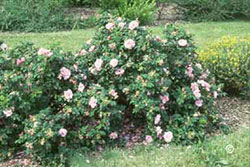Most roses benefit some winter protection in Colorado to protect them from our extreme cold and dry winds.
How do I protect roses from snow and wind damage?
If roses have grown excessively, they may be subject to snow and wind damage. To prevent this, prune all tall plants by one-third of their height in November. Otherwise, mid-April pruning is best. Around Thanksgiving, remove all leaves and debris from the ground; this will help prevent the spread of some diseases
Can I protect roses with dirt?
When the night temperatures drop to 20 degrees Fahrenheit for several days, mound soil over the rose crown. The soil should be eight to ten inches deep. Bring soil in from other parts of the garden to avoid disturbing the roots of the plant being covered.
What else can I use to protect roses?
Otherwise, gardeners can mulch heavily around the base of the rose. Use pine needles or boughs, leaves, rotted manure or shredded newspaper. Mulching roses is very important because it helps retain warmth and moisture. Rose collars are widely available at garden centers or cages can be built from wire, to hold the mulch around the base of the rose. Mulch should be removed gradually in the spring after the danger of hard frost has passed.
Is burlap an effective way of protection?
Roses, especially climbers, can benefit from being completely covered with burlap during the winter to prevent desiccation from wind.
What should I consider if I want outstanding roses?
To grow the best roses, take care to select an appropriate variety for this region, choose the proper planting site, and follow good cultural practices, and minimize insect and disease problems. Shrub roses are usually the hardiest and best-performing roses for Colorado, and come as fragrant, single-petaled or fuller flowers. Included in this group are the English Roses developed by David Austin. There are over 100 varieties and most are repeat flowering and fragrant with the flower form of the Old Garden Roses.
For more information, see the following Colorado State University Extension information:
- Selecting and Planting Roses
- Roses: Maintenance
- Pruning Roses
- Rose: Shrub Roses
- Rose Diseases
- Roses for Colorado
- Rose Care for Fall



